Poetry in Translation (CCCXLV), James KIRCUP (1918-2009)
UK/ENGLAND: “No Men Are Foreign”, “Nimeni nu e străin”
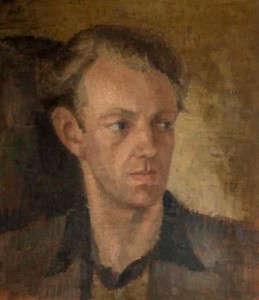
No Men Are Foreign
James KIRCUP (1918-2009)
Remember, no men are strange, no countries foreign
Beneath all uniforms, a single body breathes
Like ours: the land our brothers walk upon
Is earth like this, in which we all shall lie.
They, too, aware of sun and air and water,
Are fed by peaceful harvests, by war’s long winter starv’d.
Their hands are ours, and in their lines we read
A labour not different from our own.
Remember they have eyes like ours that wake
Or sleep, and strength that can be won
By love. In every land is common life
That all can recognise and understand.
Let us remember, whenever we are told
To hate our brothers, it is ourselves
That we shall dispossess, betray, condemn.
Remember, we who take arms against each other
It is the human earth that we defile.
Our hells of fire and dust outrage the innocence
Of air that is everywhere our own,
Remember, no men are foreign, and no countries strange.
* * * * * * * *
Nimeni nu e venetic
James KIRCUP (1918-2009)
Străine, ia aminte, nimeni nu e venetic, iar glia nu-i străină.
Sub orice uniformă acelaşi trup zvâcneşte,
Asemeni cu al nostru; iar câmpul bătăliei, cuprins de fraţii noştri,
E-aidoma cu al nostru, sub care-om zace morţi.
Avem acelaşi soare, o apă, şi-o ţărână,
Mâncăm aceleaşi fructe, trăim aceeaşi iarnă.
Avem aceleaşi inimi, în pulsul lor ghicind
Acelaşi vis cu-al nostru.
Străine, ia aminte, aidoma n-is ochii care dorm,
Care veghează, iar patosul iubirii e acelaşi.
Când vei sosi, oriunde, acelasi ţărm, găsi-vei,
Ce îl vei recunoaşte şi îl vei însuşi.
Când vom fi îndemnaţi, să luăm aminte, iarăşi,
Cu fraţi de vom trăi în vrajbă, tot noi vom fi aceia
Ce ne vom otrăvi, ne vom trăda şi osândi.
De vom fi–npinşi, vre-odată, să ne-nvrăjbim cu fraţii,
Va fi pământul nostru ce îl vom întina.
La Ziua Judecaţii neprihănit va arde
Văzduhul ce e-al nostru…
Străine, ia aminte, nimeni nu e venetic, iar glia nu-i străină.
Versiune în limba Română de Constantin ROMAN, Londra
© 2015 Copyright Constantin ROMAN, London
* * * * * * * *
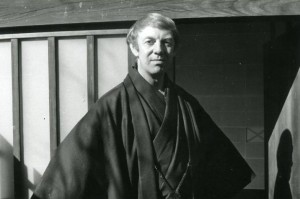 BIO NOTE: James Falconer KIRKUP, FRSL (b. 23 April 1918, South Shields, d. 10 May, 2009, Andorra) was a graduate of Durham University an internationally celebrated poet, memoirist, novelist, playwright, translator, exile and author of over 30 books, including autobiographies, novels and plays. He was elected a Fellow of the Royal Society of Literature in 1962.
BIO NOTE: James Falconer KIRKUP, FRSL (b. 23 April 1918, South Shields, d. 10 May, 2009, Andorra) was a graduate of Durham University an internationally celebrated poet, memoirist, novelist, playwright, translator, exile and author of over 30 books, including autobiographies, novels and plays. He was elected a Fellow of the Royal Society of Literature in 1962.
ACADEMIA TEACHING (Sweden, Spain, Japan): KIRKUP lectured in Sweden and Spain before taking up a succession of teaching appointments in Japan. In 1965 Kirkup won the Japan PEN Club Prize for Poetry. He established a magazine, Poetry Nippon, in 1966; and in 1969 was appointed President of the Poet’s Society of Japan. His activity in Japan culminated in a 12-year tenure as Professor of English Literature at the Kyoto University of Foreign Studies (1977-1989). His engagement with Japanese culture was characteristically quixotic. Kirkup refused to familiarise himself with the language. However, he developed an admiration for both the haiku and tanka forms of Japanese poetry, co-opting these for his own versifying in English. The apogee of his Eastern achievements was an invitation in 1997 by the Japanese emperor to participate in the Imperial New Year Poetry Reading.
SEXUALITY & self-imposed EXILE: Avatars of the Poet’s avowed sexuality came to the fore when Kirkup had placed a long poem, “The Love that Dares to Speak its Name”, in the June 1976 issue of Gay News. Its account of a Roman centurion fantasizing about having sex with the body of Christ brought it to the attention of the campaigner for public morals, Mrs Mary Whitehouse. She instigated legal proceedings against the newspaper and its editor, Denis Lemon, for the “re-crucifixion of Christ by 20th-century weapons.”
The Crown duly undertook to prosecute for blasphemy. The trial opened in July 1977 at the Old Bailey. Kirkup was “mortified” by the scandal over what he had already decided was “not aesthetically a successful work.” Being abroad during the trial, he decided to keep away. John Mortimer, barrister and author, led for the defense. Bernard Levin and Margaret Drabble agreed to defend the poem on literary grounds, though this would be ruled inadmissible Lemon and Gay News were found guilty in the last successful British prosecution for blasphemy. Lemon was given a suspended jail sentence that was overturned on appeal. The judge, Alan King-Hamilton, rejoiced in predicting that the “pendulum of public opinion was beginning to swing back to a more healthy climate”, making clear his own view of the “appalling” poem. Kirkup remained embarrassed by the whole affair, and in 2002 a commemoration of the trial which involved the banned poem’s recitation in London drew Kirkup’s disapproval; he felt he was “being used.” Soon afterwards, Kirkup moved to Andorra, where he wrote and published more prolifically than ever.
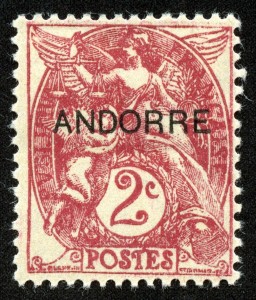

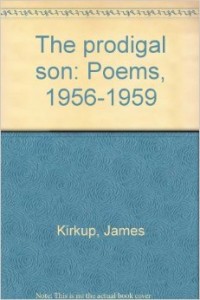
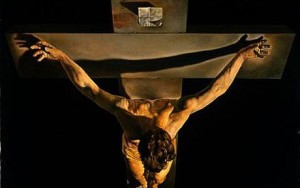

No Comments so far ↓
Like gas stations in rural Texas after 10 pm, comments are closed.